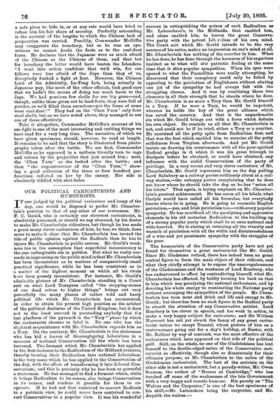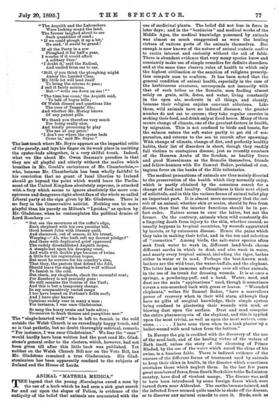OUR POLITICAL CARICATURISTS AND HUMOURISTS.
IF one judged by the political caricature and irony of the day, one would be disposed to prefer Mr. Chamber- lain's position to that of any other of our statesmen. Mr. F. C. Gould, who is certainly our cleverest caricaturist, is absolutely possessed, or should we say obsessed, by his desire to make Mr. Chamberlain ridiculous, but though he has made a great many clever caricatures of him, he has, we think, done more to make it clear that Mr. Chamberlain has turned the tide of public opinion against the Radicals than he has to injure Mr. Chamberlain in public esteem. Mr. Gould's weak- ness lies in the assumption that superficial inconsistency is the one unforgivable sin in politics. But what he really suc- ceeds in impressing on the public mind is that Mr. Chamberlain has been inconsistent as to matters of comparatively small practical significance, while he has been consistent as to a matter of the highest moment on which all his rivals hive been grossly inconsistent. For instance, Mr. Gould's admirable picture of Mr. Chamberlain standing in a Court snit on what Lord Tennyson called "the stepping-stones of our dead selves to higher things," brings out very powerfully the many phases of rather wild and hasty political life which Mr. Chamberlain has surmounted, in order to attain his present high position as the arbiter of the political destinies of the United Kingdom, but it does not in the least succeed in persuading anybody that tie last platform of the pyramid is the " Tory " phase by which the caricaturist chooses to label it. No one who has the slightest acquaintance with Mr. Chamberlain regards him as a Tory. On the contrary, Mr. Chamberlain is the statesman who has hid a leaven of thoroughgoing Liberalism in a measure of national Conservatism till the whole has been leavened. The ferment which Mr. Chamberlain has applied in the first instance to the Radicalism of the Midland counties, thereby turning their Radicalism into national Liberalism, is the very same which he has applied to the Conservatism of the day, with the effect of transforming it into Liberal Con- servatism; and this is precisely why he has been so powerful a statesman. He has managed to find a ferment which, while it brings Radicalism to its senses, also brings Conservatism to its senses, and renders it possible for them to co- operate. If he had not first contrived to convert Radicals to a patriotic view, he could never have contrived to con- vert Conservatives to a popular view. It was his wonderful success in extinguishing the poison of such Radicalism as Mr. Labouchere's, in the Midlands, that enabled him, and alone enabled him, to leaven the great Conserva- tive party with the potent Lib r dism of his own mind. The Court snit which Mr. Gould intends to be the very essence of his satire, makes no impression on one's mind at all. Mr. Chamberlain has nothing of the courtier in him. What he has done, he has done through the keenness of his sagacious instinct as to what will stir patriotic feeling at the same time that it stirs popular sympathies. When his eyes were opened to what the Parnellites were really attempting, he discovered that their conspiracy could only be foiled by appealing to the patriotism of Englishmen without abating one jot of the sympathy he had always felt with the struggling classes. And it was by combining these two elements in all their strength that he stands where he does. Mr. Chamberlain is no more a Tory than Mr. Gould himself is a Tory. If he were a Tory, he would be impotent, whereas he holds the key of the great alliance which has saved the country. And that is the unpardonable sin which Mr. Gould brings out with a force which defeats his own object. He reminds us all that Mr. Chamberlain is not, and could not be if he tried, either a Tory or a courtier. He exorcised all the petty spite from Radicalism first, and that was the feat which enabled him to exorcise all the petty selfishness from Toryism afterwards. And yet Mr. Gould insists on drawing his countenance with all the poor-spirited Radical grudge in it which it was his great triumph to dissipate before he obtained, or could have obtained, any influence with the stolid Conservatism of the party of privilege. In a very recent and very clever caricature of Mr. Chamberlain, Mr. Gould represents him as the dog pulling Lord Salisbury as a railway porter ruthlessly about at a rail- way station,—the unhappy porter complaining that he does not know where he should take the dog as he has "eaten all his labels." That again, is laying emphasis on Mr. Chamber- lain's greatest achievement. He has eaten all his labels, what Carlyle would have called all his formulas, but everybody knows where he is going. He is going to reconcile English patriotism,—yes, and Irish patriotism too,---with every popular sympathy. He has sacrificed all the paralysing and aggressive elements in his old sectarian Radicalism to the building up of a strong popular party which shall be at once national and wide-hearted. He is aiming at retaining all the vivacity and warmth of patriotism with all the width and disinterestedness of a wise and yet passionate sympathy with the struggles of the poor.
The humourists of the Conservative party have not yet found for themselves a great caricaturist like Mr. Gould. Since Mr. Gladstone retired, there has indeed been no great central figure to form the main object of their ridicule, and what they chiefly attempt is to expose the unscrupulousness of the Gladstonians and the weakness of Lord Rosebery, who has endeavoured to effect by contradicting himself, what Mr. Chamberlain has effected, by boldly turning his back on that in him which was paralysing the national enthusiasm, and by devoting his whole energy to reanimating the National party without estranging the sympathies of the people. Mr. Charn. berlain has been meat and drink and life and energy to Mr. Gould ; but there has been no such figure in the Radical party to absorb the attention of any Conservative satirist. Lord Rosebery is too clever in speech, and too weak in action, to make a very happy subject for caricature; and Sir William Harcourt has nol yet struck the fancy of any great carica- turist unless we except Tenniel, whose picture of him as a costermonger going out for a day's holiday, at Easter, with Mr. Balfour by way of contrast, was the most effective of the caricatures which have appeared on that side of the political gulf. Still, on the whole, no one of the Gladstonians has lent himself to the double-edged satire of the Conservative cari- caturist so effectively, though also so disastrously for their ultimate purpose, as Mr. Chamberlain to the satire of the Gladstonian caricaturist. The best of the satirists on the other side is not a caricaturist, but a parody-writer, Mr. Owen Seaman, the author of "Horace at Cambridge," who has touched off some of the weaknesses of the late Government with a very happy and caustic humour. His parody on "The Walrus and the Carpenter," is one of the best specimens of his skill,—Mr. Labouchere being the carpenter, and Mr. Asquith the walrus :—
"The Asquith and the Labouchere Were looking round the land, he former laughed aloud to see Such quantities of sand ; "If we could plough it up a bit,' He said, it woad be grand !
If all the Party in a row Ploughed it for half a year, I wonder if it would affect A solitary Peer.'
'I doubt it,' said the Radical, And smiled from ear to ear.
Still, if you think the ploughing might Annoy the Landed Class.
'My little lot will lend itself To bring the scheme to pass ; I call it fairly asinine, But—" write me down an ass ! "
The time has come,' the Asquith said, To talk of bogus bills ; Of Welsh dissent and questions like The cure of Tenants' ills; And whether Mr. Morley knows Of any patent pills.
We thank you therefore very much For being really nice, And kindly promising to play The ass at any price.'
don't see where the oyster beds Come in,' said Mr. Bryce."
'The lasts touch where Mr. Bryce appears as the impartial critic of the parody, and lays his finger on its weak place in omitting the oyster-beds altogether, is a very skilful touch. Indeed, what we like about Mr. Owen Seaman's parodies is that they are all playful and utterly without the malice which breathes in Mr. Gould's caricatures of Mr. Chamberlain,— who, because Mr. Chamberlain has been wholly faithful to his conviction that no grant of local liberties to Ireland should go beyond the point which would leave the Parlia- ment of the United Kingdom absolutely supreme, is attacked with a fury which seems to ignore absolutely the more con- spicuous and dangerous right-about-face of the whole so-called Liberal party at the sign given by Mr. Gladstone. There is no fury in the Conservative satirist. Nothing can be more playful than his parody on Milton's " Lycidas," as spoken by Mr. Gladstone, when he contemplates the political demise of Lord Rosebery
"But see the mourners at the coffin's edge,
Each shepherd with his own peculiar bill, Good honest John with literary quill, And shamrock, out of season, at his breast,
Weeping-4 Ah, who bath reft my dearest pledge ? '
And there with duplicated grief oppressed
The rudely disestablished Asquith mopes,
A steeple-hat upon his drooping crest, And wails with double pipe because of twins.
A little for his registration hopes,
But most he sorrows for his country's sins, That they, the pastors that defend the fold, Should leave the single-hearted wolf without To famish in the cold.
But check, my shepherds, check the mournful rout; For Resebery is not precisely gone : He still remains the Genius of the Turf; And this is but a temporary change.
In my comparatively varied range I too have tossed on Fortune's fickle surf; And I have also known
Opinions rudely veer in many a man ; For instance, I was once Gladstonian.
So sang the hoary swain and bade adieu;
To-morrow to fresh themes and pamphlets new."
he "single-hearted wolf" who is left to famish in the cold .outside the Welsh Church is an exceedingly happy touch, and so is that pathetic, but no doubt thoroughly satirical, remark, 4' For instance, I was once Gladstonian." We fear the " once " would hardly have been written had the poet read Mr. Glad- stone's general order to the electors, which, however, had not been given till after this little book was published. Yet neither on the Welsh Church Bill nor on the Veto Bill, has Mr. Gladstone remained a tree Gladstonian. His Glad- stonianism has been apparently confined to the subjects of Ireland and the House of Lords.



































 Previous page
Previous page